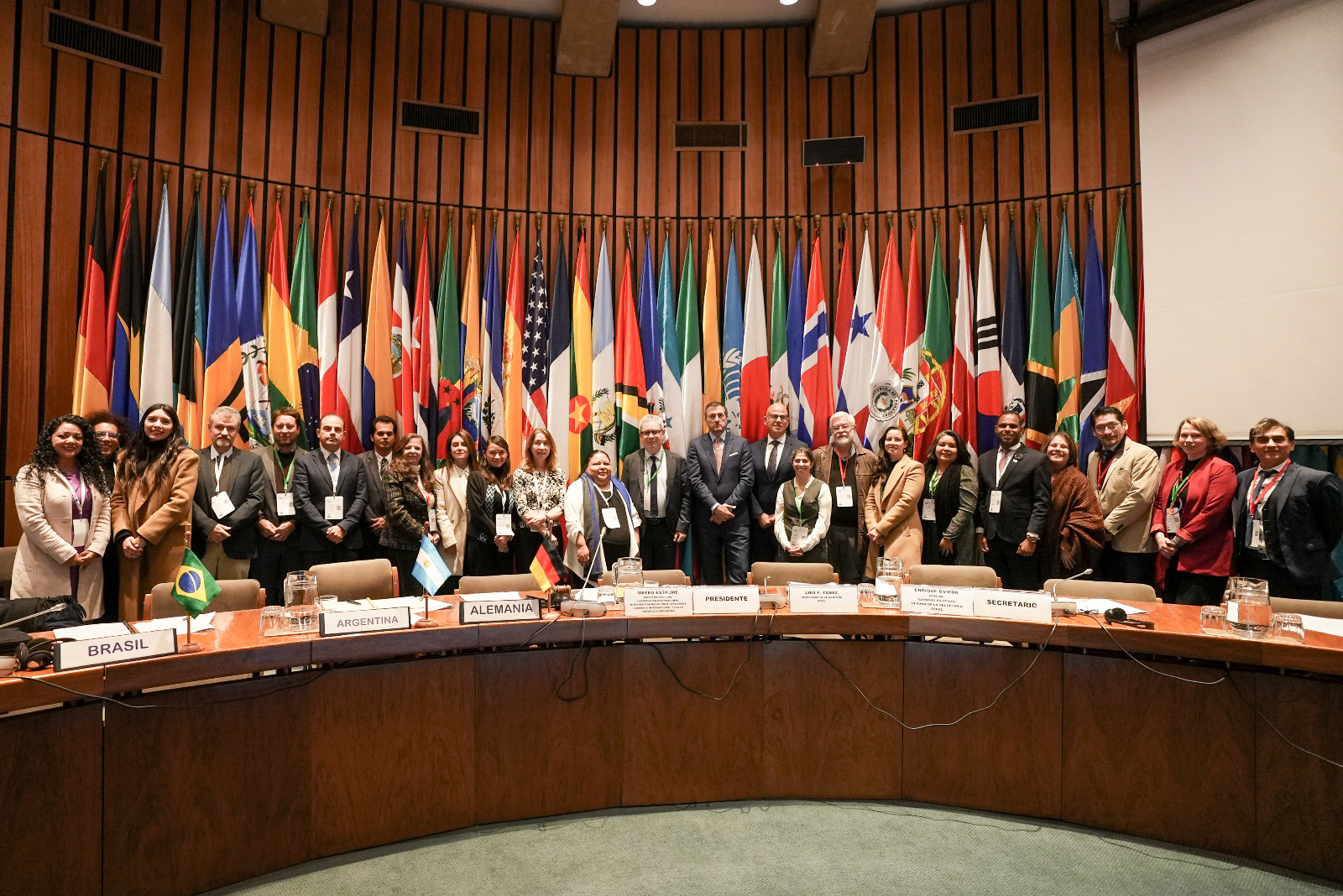First Meeting of the Presiding Officers of the Regional Conference on South-South Cooperation in Latin America and the Caribbean Took Place at ECLAC’s Headquarters
Work area(s)
At this intergovernmental event, representatives of the region’s countries, the UN System, and regional and international organizations analyzed the state of South-South and triangular cooperation as well as multi-stakeholder strategies for strengthening international development cooperation.

Representatives of government, the United Nations System, and regional and international organizations participated today in the First Meeting of the Presiding Officers of the Regional Conference on South-South Cooperation in Latin America and the Caribbean, which took place at ECLAC’s central headquarters in Santiago, Chile.
The meeting was inaugurated by Luis Fidel Yáñez, Secretary of the Economic Commission for Latin America and the Caribbean (ECLAC) – speaking on behalf of the organization’s Executive Secretary, José Manuel Salazar-Xirinachs – and Mateo Estremé, Director-General of International Cooperation at the Ministry of Foreign Affairs, International Trade and Worship of Argentina, which is the country serving as Chair of the Conference’s Presiding Officers.
The event also drew the participation of high-level authorities from Brazil, Chile, Colombia, Costa Rica, Cuba, the Dominican Republic, Ecuador, Germany, Guatemala, Mexico, Spain and Uruguay.
The meeting’s participants engaged in an assessment and evaluation of South-South and triangular cooperation; analyzed multi-stakeholder strategies as opportunities for international development cooperation; and learned about the “Strengthening Feminist Foreign Policy and Feminist International Cooperation” project, led by the Regional Fund for Triangular Cooperation in Latin America and the Caribbean.
In addition, the gathering aimed to facilitate work agreements that would bolster regional cooperation ties and promote a concerted voice from Latin America and the Caribbean, especially in light of the Summit of the Future, which will be held in September 2024 at the United Nations headquarters in New York.
In his welcome remarks, Luis F. Yáñez stressed that international cooperation has been and continues to be a driving force for economic and social progress in the world, and as a result, it has been central to our reflection and analysis of medium- and long-term economic and social trends in Latin America and the Caribbean. “We hope that the reflections, interests and concerns arising from today’s dialogue, along with the outcomes of the Summit of the Future in September, will allow us, from a cooperation perspective, to pick up the pace towards implementing the 2030 Agenda,” the senior ECLAC official stated.
Meanwhile, Mateo Estremé indicated that South-South cooperation demonstrates the solidarity between countries and has become a fundamental aspect of international development cooperation, in addition to being crucial for progress on sustainable development and fostering inclusive development and sustainable economic growth.
“I want to highlight that the work of Latin America and the Caribbean’s cooperation agencies over all these years has turned us into a very relevant actor in South-South cooperation and a global pacesetter. In addition, in order to strengthen methodologies and individual and regional capacities, it is highly necessary to create debate forums such as those held today. And ECLAC is the most conducive environment for carrying them out,” he said.
At the meeting, ECLAC – in its capacity as Secretariat of the Conference – presented a reference document entitled Path for Evaluating the Impact of Cooperation in the Framework of the Intergovernmental Meetings on South-South Cooperation of the Economic Commission for Latin America and the Caribbean (ECLAC), which outlines the ground covered in this area and the country concerns that the United Nations regional organization has worked to address over the last 15 years.
The event’s participants pointed up several significant advances in the project “Quantifying South-South cooperation to mobilize funds for the Sustainable Development Goals,” overseen by United Nations Trade and Development (UNCTAD), with the participation of the United Nations Statistics Division, four UN regional commissions, as well as other partners from the United Nations System. They took particular note of the progress made on the global and voluntary framework for measuring South-South cooperation and the pilot studies in which some of the region’s countries have already participated.
The delegates in attendance also approved a six-point draft agreement, in which they embrace the global and voluntary framework for measuring South-South cooperation led by UNCTAD; request that the Secretariat (ECLAC) devise an action plan for mainstreaming the gender perspective in international development cooperation programs and projects; and request that ECLAC prepare a substantive document (that would include an action plan) to further explore the issues of assessment and evaluation of South-South and triangular cooperation, in line with the process being led by UNCTAD, and multi-stakeholder strategies for cooperation, with the aim of presenting it to Member States at the Second Session of the Regional Conference on South-South Cooperation in Latin America and the Caribbean, to be held in 2025.
The Regional Conference on South-South Cooperation in Latin America and the Caribbean was established by virtue of Resolution 752(PLEN.36), adopted by member countries at the thirty-sixth session of ECLAC’s Committee of the Whole in December 2021.
The current Presiding Officers was elected at the First Session of the Regional Conference, held in May 2023, and comprises Argentina as Chair and Brazil, Chile, Colombia, Cuba, Ecuador, Mexico, Spain and Uruguay as Vice-Chairs.
Related content

Related link(s)
Country(ies)
- Latin America and the Caribbean
Contact
Public Information Unit
- prensa@cepal.org
- (56 2) 2210 2040
